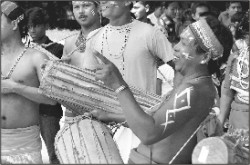Law event
Training for empowering the leaders of ethnic communities
Promoting human rights for ethnic minority
 |
Photo:Amirul Rajiv |
Bangladesh is a country with a large majority Bangali population and a small ethnic minority population who belong to about 46 different ethnic groups from the plains and also from the hill regions. This present land of Bangladesh was originally a land of trees and rivers with an Ethnic population with more than one thousand years of history and culture. The now marginalized population of Ethnic origin who either failed or refused to integrate were left on the sidelines and their land, language and culture have became endangered.
Due to lack of education, information or financial recourses, different ethnic minority people whether they are from the 'Santal' and other communities of northern Bangladesh or the 'Buno's from western part or 'Monipuri' from north-eastern part of Sylhet or hill tribes from Chittagong Hill Tracts or the 'Garo's from the greater Mymensingh districts of central Bangladesh all face the same or at least similar problems of land grabbing, violence against women (such as abduction of young women, rape, intimidation, sexual abuse, force marriage etc.), forced evictions, arson attacks, unemployment, access to resources and access to justice.
Violent attacks, harassment, and social and economic discrimination are the status quo for the Ethnic people of Bangladesh. The agents of various forms of intimidation and violence are usually Bangali land grabbers, but local officials, and hired thugs often join the latter. The most widely reported incidents are of armed attacks on villages and related acts of arson. In addition to other forms of violence, an ongoing epidemic is the phenomenon of rape and sexual assault of Ethnic women. As seen elsewhere in the world, the women of Ethnic communities are targeted in order to teach a lesson to the entire community.
For these reasons, Odhikar has been working with Ethnic community groups for raising awareness on human rights especially on ethnic rights, campaign on land rights of Ethnic Minority Communities and rights of Ethnic women through training, documentation, advocacy and publication.
The present socio economic and political situation in Bangladesh demands professionals' human rights initiatives from grass root level to national level. Women, adolescent and children of Ethnic origin are most vulnerable victims of human rights violence. Considering their situation the promotion of human rights culture in the society is urgently needed.
To address the needs identified above, Odhikar developed a project to promote "Human Rights through empowering the leaders of the Ethnic community". The activities aims to develop the knowledge and skills of the participants to monitor rights violation and to use the existing national and international mechanisms to seek effective redress.
The objective of the program is to building the capacity of the community leaders as well as staff members of the partner organizations of Action Aid Bangladesh belonging to ethnic and linguistic minority groups for promoting economic, social and cultural rights of Ethnic people in private and public, freely and without interference or any form of discrimination.
This Project has built a network with the Ethnic community organizations and has assisted them in selecting at least 3 (three) participants from each partner organization of Action Aid Bangladesh Diversity and Citizenship Theme and community organizations for this course. A total of 106 participants received the training, in which at least 30% came from Action Aid partner organizations. There course was divided into five topics and took three days to complete. They were conducted in 5 Districts in 5 Divisions where an average of 25 participants attended each course. Focus of the course has been given on the 1989 Ethnic and tribal peoples Convention and the Declaration on the Rights of Persons Belonging to National or Ethnic, Religious and Linguistic Minorities. Women and child rights, land rights along with violence against Ethnic women were also discussed intensively. This course was designed based on participatory approach with interactive and learner centered processes.
Objectives of human rights training
* To define rights, human rights and needs
* To differentiate between rights and needs
* To analyze conceptual framework of Rights Based Approach (RBA), its characteristics, its tools and its application procedure
* To provide information on international human rights mechanisms, systems, standards and issues related to the work of the Indigenous groups
* To analyze fundamental rights, laws, policies, issues related to the work of the indigenous groups
* To make participants sensitize to claim their rights and determine strategies to realize public services from the duty bearers
* To maximize knowledge on existing national and international laws and conventions to promote and protect rights of indigenous people
* To become familiar with different levels to work in order to secure the rights and services for the indigenous people
* To stimulate participants to their particular role in protecting and promoting human rights and their own potential for affecting human rights in their daily work
At the end of every course, the participants shared their feelings. Most mentioned that they regretted not having attended such a course earlier. They wanted to organize more human rights training courses for their community. One participant from the Rakhain community confirmed that they are entirely excluded as a people. They have no chance to participate in the mainstream decision making process.
This initiative has opened an intensive opportunity to develop a network with the ethnic minority communities, which it is hoped, will be advantageous to the communities and which will assist to reduce human rights violations against ethnic people across the country.
Source: Law desk.